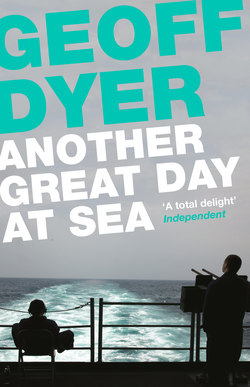Читать книгу Another Great Day at Sea - Geoff Dyer - Страница 9
На сайте Литреса книга снята с продажи.
Оглавление4
The beach came up again, at Carrier Control Approach, which we visited after dark.
‘Back at the beach, the field is always there,’ said one of the guys, looking up quickly from his screen. It sounded like the beginning of one of those coded radio announcements from the BBC to the French Resistance ahead of D-Day. Either that or a line from a draft of a Wallace Stevens poem. There followed a long interval of silence before whatever was happening on-screen allowed him to resume and complete. ‘Yeah, their field is always there. Whereas our airport moves.’
There were sixteen people in the CCA, all zipped up in cosy military jackets, monitoring what looked like a billion dollars’ worth of computer screens and radar maps. It was icy as a Vegas hotel and dark as a nightclub. There was even some UV light, emphasizing the white, ghostly, snowy stuff that hung from the ceiling in readiness for Halloween. The temperature had to be kept low because of the equipment but it also meant that there was no chance of anyone dozing off and taking a nap. Just trying to keep warm meant the brain was in a state of constant high alert. The darkness brought out the greens, purples, yellows and reds of the screens. There was an air of relaxed and chilly attention. Someone was drinking coffee from a clear mug with a slice of orange in it—a strange drink. A supervisor stood in the middle of the room, looking over people’s shoulders, checking to see how they were doing their jobs. He was a trainee supervisor and someone was watching over him too. Thus the naval hierarchy towers over the boat like the island over the flight deck. I started to wish I’d worn a thick pullover and wondered what coffee with a slice of orange tasted like. But mainly I was glad I had no one looking over my shoulder, checking on how I was doing my job.
We’d got here half an hour before the birds would start landing. As the time for recovery drew near the atmosphere changed, from attentive to highly focused. With the screens full of data I was reminded, as I had been on the flight deck, of the financial markets, this time with some kind of crisis beginning to make itself felt: a plunge in the FTSE 100, a devastating surge in the NASDAQ. I’d never been in an environment where a slow intensification of concentration was so marked. One of the screens went down. Came back again. I’d heard of the stress of air traffic control, had seen United 93 in which the controllers manoeuvre aircraft from the path of the hijacked planes. This was more stressful in a way—‘our airport moves’—but the number of planes was minimal compared with however many thousands it was that came barrelling in over London every day, hoping to squeeze into a landing spot at Gatwick and Heathrow without circling for hours in a rush-hour holding pattern. The controllers had a distinct way of speaking to the pilots. Firm enough that the idea of not complying did not even occur; relaxed enough that no one would feel they were being bossed around (thereby engendering the reflex urge to do the opposite).
Plasma screens displayed numbers, data and radar info; others transmitted the action on deck as planes came thumping down in the dark, one after another. The picture quality was roughly that of CCTV footage in a Stockwell off-licence. Everything went like clockwork—a phrase which, in this context, sounds several centuries out of date. The birds were all back.
And would stay back till morning. That’s right: flight ops finished at about 2140! Newell had known this all along. The talk about planes coming and going like Lionel Richie, all night long, had been just a joke. Everyone was home and would stay home. We were going to have a quiet night in. There would actually be a long interval of what passed, in these parts, for silence.
Lights Out—at ten p.m.—was preceded by an announcement broadcast over the whole ship: a little parable followed by a prayer. It was a nice way of rounding off the day and binding the ship together, those sharing a dorm with two hundred others, officers in a room for six, and the privileged few who had rooms to themselves, who lay in their bunks in the tired knowledge that if they woke in the night needing to pee the basin was only a yard away.
There may have been no jets landing but my stateroom was regularly engulfed by new sources of industrial clamour that earplugs were powerless to keep at bay. I was jolted awake throughout the night but always managed to get back to sleep, partly because the default silence was anything but. It wasn’t even white noise, more like dark grey shading into black as air, water, heat, coolant and—for all I knew—ammunition or loaves of bread went whistling, howling, surging, clanking, pouring and thumping through the gates and alleys of the carrier’s life-support system.
